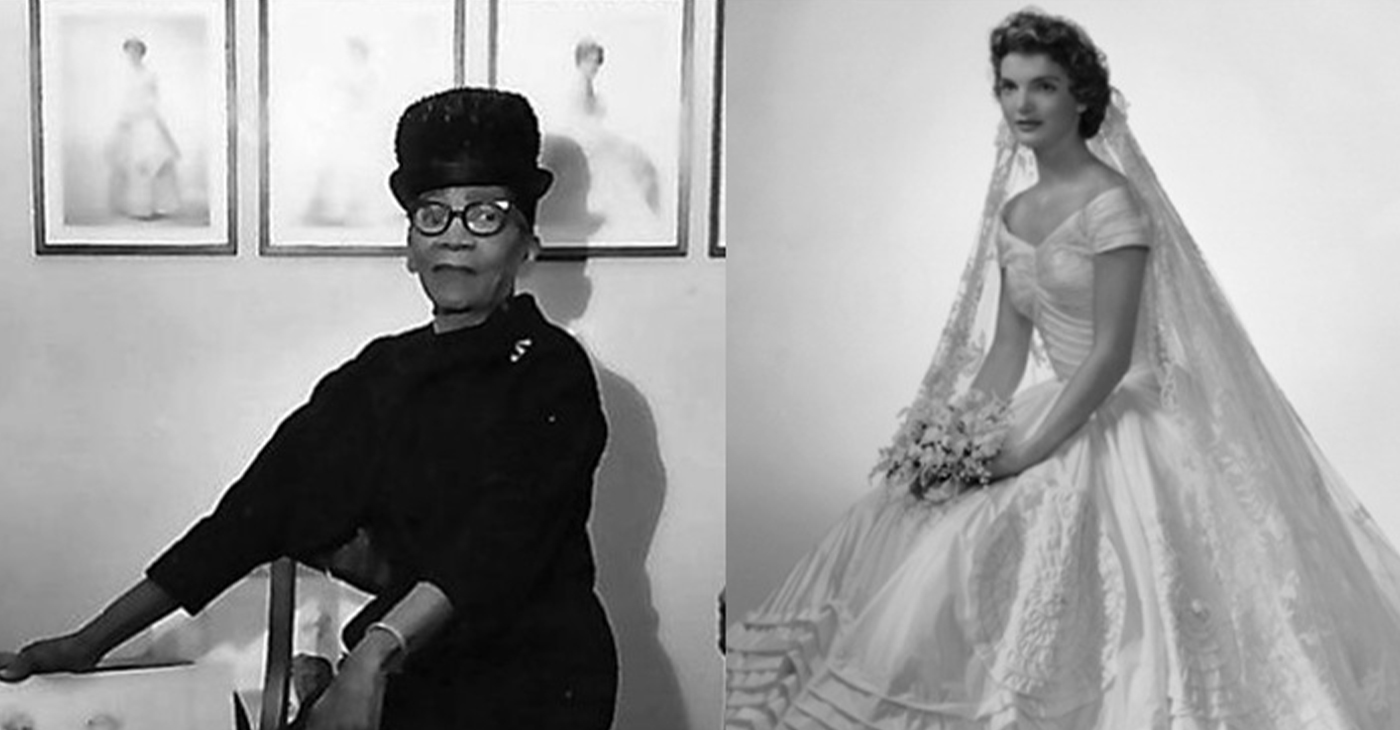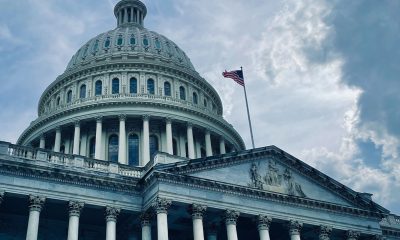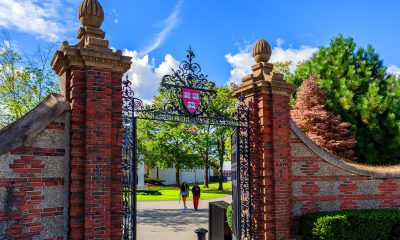Activism
Panel Discusses Supreme Court Case Threatening End of Affirmative Action
On Oct. 31, SCOTUS listened to oral arguments in two cases challenging race-conscious student admissions policies used by Harvard University and the University of North Carolina (UNC) to promote creating diverse student populations at their schools. The case emerged in 2014, when SFFA, a nonprofit advocacy organization opposed to affirmative action, brought an action alleging Harvard violated Title VI of the Civil Rights Act (Title VI).

By Antonio Ray Harvey | California Black Media
A webinar hosted by ChangeLawyers, the American Constitution Society (ACS) Bay Area, and Equal Justice Society was held Nov. 15 to discuss the possible outcomes of the pending decision by the Supreme Court of the United States (SCOTUS) in the case of Students for Fair Admissions (SFFA) v. Harvard.
The online event titled, “The End of Affirmative Action: How SCOTUS Is Coming After BIPOC Students” delved into the impact of banning the consideration of race as a factor during the college admissions process.
Black, Indigenous, and People of Color (BIPOC) students would be affected by such a ruling, said panelist Lisa Holder, an attorney and president of Equal Justice Society (EJS). EJS is an Oakland-based nonprofit and civil rights organization that does work geared toward transforming the nation’s consciousness on race through law, social sciences, and the arts.
“(Ending Affirmative Action) essentially, completely upends our ability to level the playing field and remediate for centuries of discrimination and marginalization,” said Holder. “If you do not have intervention and take affirmative steps to counteract continued systemic racism, it’s going to take hundreds of years to repair those gaps. It will not happen by itself.”
Holder is also a member of the California Task Force to Study and Develop Reparation Proposals for African Americans, a nine-member panel established after Gov. Gavin Newsom signed Assembly Bill 3121, authored by then-Assemblymember Shirley Weber. The task force is investigating the history and costs of slavery in California and is charged with recommending an appropriate remedy for the state to implement.
Also participating on the End of Affirmative Action panel were Sally Chen, education equity program manager at Chinese for Affirmative Action, and Sarah C. Zearfoss, senior assistant dean for the University of Michigan Law School.
Shilpa Ram — senior staff attorney for Education Equity, Public Advocates and a board member of the ACS Bay Area Lawyer Chapter — was the moderator.
On Oct. 31, SCOTUS listened to oral arguments in two cases challenging race-conscious student admissions policies used by Harvard University and the University of North Carolina (UNC) to promote creating diverse student populations at their schools.
The case emerged in 2014, when SFFA, a nonprofit advocacy organization opposed to affirmative action, brought an action alleging Harvard violated Title VI of the Civil Rights Act (Title VI).
SFFA argues that Harvard instituted a race-conscious admissions program that discriminated against Asian American applicants. SFFA also alleges that UNC is violating the Equal Protection Clause of the 14th Amendment, by unfairly using race to provide preference to underrepresented minority applicants to the detriment of white and Asian American applicants.
Chen, of Chinese for Affirmative Action, is a first-generation college graduate from a working-class immigrant family. She is an alumna of Harvard College. She was one of eight students and alumni that gave oral testimony in support of affirmative action in the 2018 federal lawsuit Students for Fair Admissions, Inc. v. Harvard.
“Particularly as these cases were taking advantage of a claim that Asian American students don’t benefit from Affirmative Action or are harmed; we really saw how this was a misrepresentation of our community needs,” Chen said of hers and seven other students’ testimonies. “My testimony really spoke to that direct experience and making clear that Asian American students and communities are in support of affirmative action.”
In 1965, President Lyndon B. Johnson issued Executive Order 11246, requiring all government contractors and subcontractors to take affirmative action to expand job opportunities for minorities.
Fifty-seven years later, a decision by SCOTUS could be reached at the end of the current term in late June or early July 2023 banning affirmative action. The decision would dismantle race-conscious admission policies that overwhelmingly help BIPOC students create a better future for themselves, members of the panel stated.
“Schools take race into account as a factor in admission because that is the single-best, most effective way to create a racially diverse class,” Zearfoss said.
Zearfoss directs the University of Michigan Law School Jurist Doctorate (JD) and Master of Law (LLM) admissions and supervises the Office of Financial Aid.
California ended affirmative action policies in 1996 with the passage of Proposition 209.
Prop 209 states that the government and public institutions cannot discriminate against or grant preferential treatment to persons based on race in public employment, public education, and public contracting.
Proposition 16 was a constitutional amendment designed to repeal Prop 209, but the initiative was defeated by voters in 2020. Secretary of State Dr. Shirley Weber introduced the legislation that was the basis for Prop 16 when she was a state Assemblymember for the 79th District.
“When we no longer live in a white supremacist society then we can start thinking about ending these interventions that are necessary to counteract preferences for white people that exist and continue to exist,” Holder said.
Activism
Ann Lowe: The Quiet Genius of American Couture
Lowe was born in Clayton, Alabama, into a family of gifted seamstresses. Her mother and grandmother were well-known dressmakers who created exquisite gowns for women in the area. By the time Lowe was a young girl, she was already showing extraordinary talent — cutting, sewing, and decorating fabric with a skill that far exceeded her age. When her mother died unexpectedly, Lowe – only 16 years old then – took over her mother’s sewing business, completing all the orders herself.

By Tamara Shiloh
Ann Cole Lowe, born Dec.14, 1898, was a pioneering American fashion designer whose extraordinary talent shaped some of the most widely recognized and celebrated gowns in U.S. history.
Although she designed dresses for society’s wealthiest families and created masterpieces worn at historic events, Lowe spent much of her life in the shadows — uncredited, underpaid, yet unmatched in skill. Today, she is celebrated as one of the first nationally recognized African American fashion designers and a true visionary in American couture.
Lowe was born in Clayton, Alabama, into a family of gifted seamstresses. Her mother and grandmother were well-known dressmakers who created exquisite gowns for women in the area. By the time Lowe was a young girl, she was already showing extraordinary talent — cutting, sewing, and decorating fabric with a skill that far exceeded her age. When her mother died unexpectedly, Lowe – only 16 years old then – took over her mother’s sewing business, completing all the orders herself. This early responsibility would prepare her for a lifetime of professional excellence.
In 1917, Lowe moved to New York City to study at the S.T. Taylor Design School. Although she was segregated from White students and forced to work separately, she, of course, excelled, graduating earlier than expected. Her instructors quickly recognized that her abilities were far above the typical student, especially her skill in hand-sewing, applique, and intricate floral embellishment – techniques that would become her signature.
Throughout the 1920s and 1930s, she designed gowns for high-society women in Florida and New York, operating boutiques and working for prestigious department stores. Her reputation for craftsmanship, originality, and elegance grew increasingly. She was known for creating gowns that moved beautifully, featured delicate hand-made flowers, and looked sculpted rather than sewn. Many wealthy clients specifically requested “an Ann Lowe gown” for weddings, balls, and galas.
Her most famous creation came in 1953: the wedding gown worn by Jacqueline Bouvier when she married Massachusetts Sen. John F. Kennedy. The dress – crafted from ivory silk taffeta with dozens of tiny, pleated rosettes – became one of the most photographed bridal gowns in American history. Despite this achievement, Lowe received no public credit at the time. When a flood destroyed her completed gowns 10 days before the wedding, she and her seamstresses worked day and night to remake everything – at her own expense. Her dedication and perfectionism never wavered.
She eventually opened “Ann Lowe Originals,” her own salon on New York’s Madison Avenue. She served clients such as the Rockefellers, DuPonts, Vanderbilts, and actresses like Olivia de Havilland. Yet even with her wealthy clientele, she struggled financially, often undercharging because she wanted every dress to be perfect, even if it meant losing money.
Lowe’s contributions were finally recognized later in life. Today, her exquisite gowns are preserved in museums, including the Smithsonian National Museum of African American History and Culture and the Metropolitan Museum of Art.
In the last five years of her life, Lowe lived with her daughter Ruth in Queens, N.Y. She died at her daughter’s home on Feb. 25, 1981, at the age of 82, after an extended illness.
Activism
2025 in Review: Seven Questions for Black Women’s Think Tank Founder Kellie Todd Griffin
As the president and CEO of the California Black Women’s Collective Empowerment Institute, Griffin is on a mission to shift the narrative and outcomes for Black women and girls. She founded the nation’s first Black Women’s Think Tank, securing $5 million in state funding to fuel policy change.

By Edward Henderson
California Black Media
With more than 25 years of experience spanning public affairs, community engagement, strategy, marketing, and communications, Kellie Todd Griffin is recognized across California as a leader who mobilizes people and policy around issues that matter.
As the president and CEO of the California Black Women’s Collective Empowerment Institute, Griffin is on a mission to shift the narrative and outcomes for Black women and girls. She founded the nation’s first Black Women’s Think Tank, securing $5 million in state funding to fuel policy change.
Griffin spoke with California Black Media (CBM) about her successes and setbacks in 2025 and her hopes for 2026.
Looking back at 2025, what stands out to you as your most important achievement and why?
Our greatest achievement in this year is we got an opportunity to honor the work of 35 Black women throughout California who are trailblazing the way for the next generation of leaders.
How did your leadership, efforts and investments as president and CEO California Black Women’s Collective Empowerment Institute contribute to improving the lives of Black Californians?
We’re training the next leaders. We have been able to train 35 women over a two-year period, and we’re about to start a new cohort of another 30 women. We also have trained over 500 middle and high school girls in leadership, advocacy, and financial literacy.
What frustrated you the most over the last year?
Getting the question, “why.” Why advocate for Black women? Why invest in Black people, Black communities? It’s always constantly having to explain that, although we are aware that there are other populations that are in great need, the quality-of-life indices for Black Californians continue to decrease. Our life expectancies are decreasing. Our unhoused population is increasing. Our health outcomes remain the worst.
We’re not asking anyone to choose one group to prioritize. We are saying, though, in addition to your investments into our immigrant brothers and sisters – or our religious brothers and sisters – we are also asking you to uplift the needs of Black Californians. That way, all of us can move forward together.
What inspired you the most over the last year?
I’ve always been amazed by the joy of Black women in the midst of crisis.
That is really our secret sauce. We don’t let the current state of any issue take our joy from us. It may break us a little bit. We may get tired a little bit. But we find ways to express that – through the arts, through music, through poetry.
What is one lesson you learned in 2025 that will inform your decision-making next year?
Reset. It’s so important not to be sitting still. We have a new administration. We’re seeing data showing that Black women have the largest unemployment rate. We’ve lost so many jobs. We can have rest – we can be restful – but we have to continue the resistance.
In one word, what is the biggest challenge Black Californians faced in 2025?
Motivation.
I choose motivation because of the tiredness. What is going to motivate us to be involved in 2026?
What is the goal you want to achieve most in 2026?
I want to get Black Californians in spaces and places of power and influence – as well as opportunities to thrive economically, socially, and physically.
Activism
BRIDGE Housing President and CEO Ken Lombard Scores Top Honors for Affordable Housing Leadership
The Development Company of the Year honor represents a milestone for BRIDGE Housing, which received the Gold award—its top designation—in a category that included both affordable and market-rate developers. The recognition caps what has been one of the strongest growth periods in the organization’s 42-year history.

By the Oakland Post Staff
San Francisco-based BRIDGE Housing and its president and CEO, Ken Lombard, have been named among the nation’s housing industry standouts, earning two of the top prizes at the 2025 Multi-Housing News Excellence Awards.
BRIDGE Housing was named Development Company of the Year, while Lombard received Executive of the Year, recognition that places the nonprofit affordable housing provider alongside leading national developers of both affordable and market-rate housing.
The awards were announced in New York for the accomplishments achieved during 2024.
Multi-Housing News is one of the industry’s most respected publications. Award winners are selected by a panel of housing professionals, including multifamily developers, architects, and owners.
“BRIDGE Housing is deeply honored to be recognized by Multi-Housing News and our industry peers,” Lombard said. “These awards are a testament to the high-impact, mission-driven work by BRIDGE’s exceptional team to deliver quality affordable housing and support services that empower residents to improve their lives.”
The Development Company of the Year honor represents a milestone for BRIDGE Housing, which received the Gold award—its top designation—in a category that included both affordable and market-rate developers. The recognition caps what has been one of the strongest growth periods in the organization’s 42-year history.
In 2024, BRIDGE significantly expanded its footprint across California, Oregon, and Washington. That momentum continued into 2025, with portfolio growth of 9%, including the addition of nine new communities and 1,187 new or acquired affordable housing units. The nonprofit also added three new projects to its development pipeline as it nears a portfolio of 16,000 units.
The growth reflects a broader strategy aimed at accelerating both acquisitions and ground-up development, supported by partnerships with major financial institutions and innovative capital markets strategies. BRIDGE has also emphasized high-quality design and deep community engagement as central elements of its approach.
BRIDGE became the first affordable housing developer to issue tax-exempt construction bonds for one of the largest affordable housing projects in Portland, Ore., leveraging its strong credit rating.
Earlier this year, the nonprofit launched the BRIDGE Housing Impact Fund, with a goal of investing $1 billion to preserve and create affordable housing. It also closed on $175 million in taxable general-obligation bonds after increasing the offering in response to strong investor demand.
The company’s performance also underscores the role of Lombard, who has led BRIDGE since 2021 and was honored individually for his leadership.
Under Lombard’s tenure, BRIDGE has built a new leadership team with experience drawn from both the nonprofit and private sectors, with a particular focus on what the organization describes as efforts to “break the status quo,” especially in affordable housing finance. Those initiatives have helped reduce capital and construction costs, strengthen relationships with institutional investors, and expand resident support services.
Today, BRIDGE Housing serves more than 33,000 residents across 139 communities on the West Coast.
“Ken has dedicated his career to innovative real estate solutions that improve the quality of life in underserved neighborhoods,” said Kenneth Novack, chair of BRIDGE Housing’s board of directors. “His visionary leadership and the work of our incredible team have positioned BRIDGE for long-term growth that will extend our impact throughout the West Coast.”
Founded in 1983, BRIDGE Housing has helped create more than 23,000 affordable homes with a total development cost of $6 billion.
-

 Activism4 weeks ago
Activism4 weeks agoOakland Post: Week of November 12 – 18, 2025
-

 Activism4 weeks ago
Activism4 weeks agoIN MEMORIAM: William ‘Bill’ Patterson, 94
-

 Activism4 weeks ago
Activism4 weeks agoHow Charles R. Drew University Navigated More Than $20 Million in Fed Cuts – Still Prioritizing Students and Community Health
-

 Bay Area4 weeks ago
Bay Area4 weeks agoNo Justice in the Justice System
-

 #NNPA BlackPress3 weeks ago
#NNPA BlackPress3 weeks agoBeyoncé and Jay-Z make rare public appearance with Lewis Hamilton at Las Vegas Grand Prix
-

 #NNPA BlackPress3 weeks ago
#NNPA BlackPress3 weeks agoLewis Hamilton set to start LAST in Saturday Night’s Las Vegas Grand Prix
-

 Activism3 weeks ago
Activism3 weeks agoOakland Post: Week of November 19 – 25, 2025
-

 #NNPA BlackPress2 weeks ago
#NNPA BlackPress2 weeks agoLIHEAP Funds Released After Weeks of Delay as States and the District Rush to Protect Households from the Cold

















































